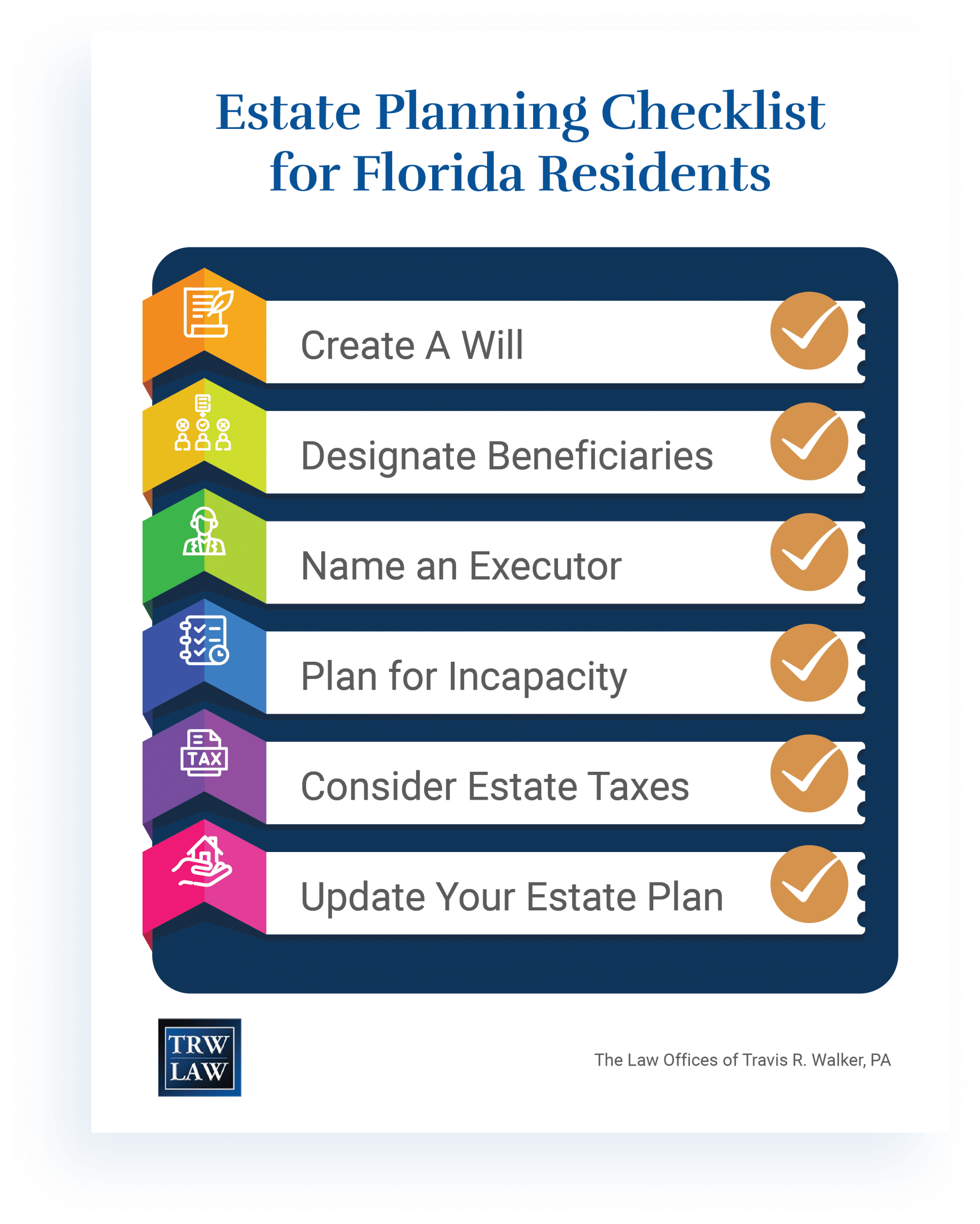Understanding the four key components of a will ensures the document’s clarity and legal validity. The testator’s information, declaration of intent, beneficiary designations, and executor appointment minimize the risk of disputes and fulfill the testator’s intentions. The Law Offices of Travis R. Walker, P.A., has experienced Florida estate planning attorneys who can assist with this process.
A will serves as the cornerstone of estate planning. This document ensures your wishes are honored and your assets distributed according to your intentions. The absence of a legally valid will can lead to unintended consequences under intestacy laws.
There are four major components of a will that combine to create a legally binding document:
- The testator's information establishes the identity of the person creating the will.
- The declaration of intent states the document is intended to be the testator's last will and testament.
- The beneficiary designations outline how the testator wants their assets to be distributed after their death.
- The executor appointment names the party who will carry out the terms of the will and manage the estate.
The Law Offices of Travis R. Walker, P.A., can help you navigate all four major components of a will. We offer personalized estate planning solutions for individuals and businesses. Our highly experienced attorneys will tailor your plan to your preferences, maximizing the value of your estate. You can trust your assets will be directed as per your wishes. Contact us to learn more about how we can assist with your estate planning in Florida.
The Essential Elements of a Will
The Four Essential Components of a Will:
- Testator’s Information
- Declaration of Intent
- Beneficiary Designations
- Executor Appointment
Creating a will involves a thoughtful consideration of four fundamental components. At the Law Offices of Travis R. Walker, P.A., our top-rated law firm can assist in drafting documents containing each necessary component so you have a legally binding will in Florida.
Component 1: Testator's Information
At the heart of every last will and testament is the testator. This individual creates the document to outline their wishes regarding the distribution of assets and the guardianship of dependents. It’s essential to verify the testator’s identity while creating the will. Without verification, anyone could fraudulently create a will in another person’s name.
Our rigorous verification process brings an extra layer of assurance and integrity to your will. We will carefully review any existing legal documents, identification, and paperwork. We may ask the testator to provide a driver’s license, passport, or other government-issued identification. These documents serve as tangible proof of the testator’s identity.
Component 2: Declaration of Intent
The Declaration of Intent is one of the integral parts of a will. The aspects of the Declaration of Intent include:
- Clarity of purpose: The declaration must clearly state it is the testator's last will and testament. Also, it needs to express the intention to distribute the testator's assets and address other matters following their wishes.
- Reflecting testator's intentions: The declaration must accurately capture the testator's wishes regarding the distribution of assets among beneficiaries and the appointment of guardians for minor children, if applicable.
- Revocation of previous wills: The document should also include a statement revoking any previous wills, allowing it to take precedence.
Since the declaration of intent is legally binding, all language must be precise and unambiguous. At The Law Offices of Travis R. Walker, P.A., we will ensure these declarations meet all legal requirements in Florida.
Component 3: Beneficiary Designations
While all will sections are vital to an estate plan, beneficiary designations are paramount. This process involves thoughtful consideration and precise documentation. A testator may designate several types of beneficiaries, including the following:
- Specific beneficiaries: The testator explicitly names these individuals or entities, assigning each to receive particular assets outlined in their wishes.
- Residuary beneficiaries: These beneficiaries will receive whatever remains of the deceased person's estate after all specific gifts, debts, expenses, and taxes have been distributed.
- Contingent beneficiaries: These individuals or entities receive assets or benefits when certain conditions are met. For example, if the primary beneficiary is unable or unwilling to inherit a certain property, it will go to the contingent beneficiary.
The lawyers at The Law Offices of Travis R. Walker, P.A., provide comprehensive assistance and legal experience to ensure you make informed beneficiary decisions. We will thoroughly examine your assets, family structure, and specific wishes. We handle all fundamental pieces of a will, including beneficiary designations. Our legal team ensures your assets are distributed according to your wishes in a legally sound manner.
Component 4: Executor Appointment
Choosing an executor involves selecting a responsible and trustworthy person, often a family member, friend, or professional, to manage your estate and carry out the instructions in your will. You may want to name an alternate executor if the primary choice cannot serve. If you don’t name an executor in your will, the court will appoint someone to handle your estate.
The Law Offices of Travis R. Walker, P.A., can assist in choosing the right person for this role. We help in the selection process, offering insight into who would be well-suited for the position. We can also meet with the individual to ensure they know all the fundamentals of the executor designation.
Additional Considerations
Creating a will involves addressing additional considerations beyond asset distribution. These other important aspects of a will include:
- Guardianship for minor children: Designating guardians ensures the well-being and care of your children.
- Funeral and burial instructions: Expressing your preferences for your final arrangements will relieve your loved ones of the burden of making decisions during difficult times.
- Handling digital assets and liabilities: In the digital age, accounting for your online presence, financial accounts, and digital assets is another, often overlooked, aspect of will creation.
The Legal Process of Creating a Will
Once you have outlined the crucial elements in a will, you can move to the creation process. In Florida, there are several steps to craft a will:
- Consultation: The process begins with a detailed consultation with our skilled attorneys. We listen to your wishes, assess your assets, and provide personalized advice based on your situation.
- Drafting: Our experienced team drafts a clear and comprehensive will, incorporating your intentions and addressing potential contingencies.
- Review and revisions: We thoroughly check before finalizing the document to ensure accuracy and completeness. Any necessary modifications will align with your current circumstances, such as a divorce or the birth of a child.
- Execution: The final step involves formally executing the will, adhering to Florida's legal requirements. Our team ensures all necessary signatures and formalities are complete under state law.
- Safekeeping: The Law Offices of Travis R. Walker, P.A., provide secure storage for your will, protecting it from loss or unauthorized access.
Working with the knowledgeable lawyers at The Law Offices of Travis R. Walker, P.A., can provide peace of mind. We can assist you by doing the following:
- Providing personalized legal advice
- Navigating any potential complications regarding assets or beneficiaries
- Offering full compliance with Florida’s laws
- Providing document preparation and review
- Maintaining confidentiality throughout the estate planning process
When you work with The Law Offices of Travis R. Walker, P.A., we can ensure you avoid some of the common pitfalls found in the core sections of a will, such as the following:
- Vague language: Ambiguity can lead to misunderstandings and disputes among beneficiaries.
- DIY wills: Opting for a do-it-yourself template may seem convenient, but it often lacks the legal expertise to cover all aspects of your unique situation.
- Failure to update: Circumstances change over time, and failing to update your will accordingly can result in unintended consequences.
- Incomplete asset coverage: Some individuals may overlook certain assets when drafting their wills, leading to potential complications.
Reach Out To Learn More About the Will Creation Process
Experienced legal guidance from The Law Offices of Travis R. Walker, P.A., can help you receive the advice you need to create a valid will in Florida. Our testimonials show our commitment to delivering exceptional service to all estate planning clients in Florida.
Whether you need to create or update wills, our team provides a secure and confident approach to protect your future. Contact us at (772) 708-0952 to schedule a consultation.












